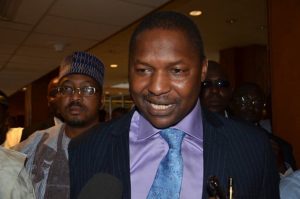
Attorney-General of the Federation and Minister of Justice, Abubakar Malami (SAN), has said the fate of Ibrahim Magu would be determined by certain circumstances.
In an interview with Daily Trust, Malami said he does not have any issue with the former acting Chairman of the Economic and Financial Crimes Commission (EFCC).
Malami said he does not know if Magu will be charged for corruption, adding that he would not try to be pre-emptive.
The minister said: “I am not sure and would not try to be pre-emptive as to the content of the report while the work is in progress. ”
Malami also disclosed how Magu was removed as the head of the agency and the process that led to the appointment of Bawa as the new EFCC boss.
He said, “The government as an institution has various ways and means through which it could arrive at a decision. If you are talking of the appointment of the chairman of the agency of government, these are issues that are regulated by law, devoid of any extraneous consideration. So, if the law powers in the president to appoint the chairman of the commission, the fact that there exists extraneous consideration with a particular reference to a committee effort put in place that is meant to investigate administrative discretion of the institution or persons associated with it, does not take away the powers of the president to make such appointment at his discretion and its own time.
“What I am saying is that does not mean that the report can’t be looked into. The second way that the government can look into the report is to form a white paper committee to look into the report and then form a federal executive council memo.
“A white paper committee forms a white paper, formulates a report and then presents it to the federal executive council for consideration, adoption or deliberation and a decision is taken. A white paper committee is an alternative option. What I am labouring to say is what should be done with a report is a function of law, administrative processes and procedures. Where the law is clear as to what needs to be done and processes are stated in the law. The law naturally takes its course without considering extraneous processes. Where the law is silent, administrative processes relating to the white paper and federal executive deliberations on the committee’s white paper may come to play.
“These things must be looked into logically and with particular regard and consideration to the prevailing law and administrative processes relating to salient issues associated with an enquiry.”
“One clear answer I can give you about the timeline is that the government takes its time. The committee of enquiry was put in place, the time was extended along the line, thereafter, upon submission of the report of enquiry, the government continued with the process of doing the needful. After submission of the report, the government has taken a decision in line with the prevailing legislation on the appointment of the chairman of the Economic and Financial Crimes Commission (EFCC).”
Naija News recalls that Malami had petitioned President Muhammadu Buhari over allegations of corruption and insubordination against Magu.
The former acting EFCC chair was subsequently arrested, detained and suspended as head of the anti-graft agency.
A panel headed by Ayo Salami, a retired judge, was inaugurated by the President to probe the allegations against the former EFCC boss.
The panel recommended the removal of Magu and advised the president to look outside the police while appointing the next EFCC chairman.
Prior to the appointment of Abdulrasheed Bawa as chairman of the anti-graft agency, all the other heads of the EFCC were police officers.
While the aspect of the report that has to do with the appointment of a new EFCC chairman has been implemented, not much has been heard of other aspects, particularly on Magu.


